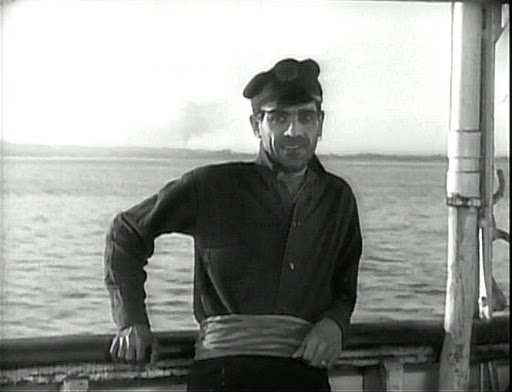It takes a couple of scenes for Two Arabian Knights to
reveal that it is truly a comedy. The film is set near the end of World War I
and begins with two men fighting each other in a pit. They are American
soldiers, W. Daingerfield Phelps III (the pretty one with the clever ideas,
played by William Boyd) and Sgt. Peter O’Gaffney (the tough guy, a former con
artist, played by Louis Wolheim), and they’ve just been captured by the
Germans. They obviously didn’t like each other before being captured, and it
takes a while for them to bond over their plans to escape from a prison camp in
northern Germany. Through a series of misadventures, they wind up on a train
bound for Turkey and then on a boat headed for Arabia. Each of these locations
presents a new dilemma for them. They manage to escape the train by setting
fire to some hay and then jumping onto a wagon carrying even more hay. The time
on the boat involves them rescuing a beautiful Arabian princess named Mirza
(played by Mary Astor) from near drowning and then having to escape possible
death in Arabia at the hands of Mirza’s intended husband. Those might not sound
like comedic bits, but each one of them involves some form of physical comedy.
For example, the escape from the prison camp involves them stealing a couple of
white robes so that they can blend in with the snow. Of course, they have large
identification numbers on the backs of the robes, but never mind. They have to
crawl under two barbwire fences, all while distracting a German shepherd who
mimics their movements. They then almost get caught when Pete almost sneezes,
but thoughtfully, Boyd’s character (whom Pete nicknames “Brains”) hits him and
knocks him out. Then, of course, he has to dunk Pete’s head under water in
order to revive him. It’s quite silly, especially when they emerge from the
water and their robes freeze in a position that leaves the bottom flared out
like a dress over a hoop skirt. The film must have been beautiful in its
original condition, but even with a restoration about a decade ago, some images
are almost completely gone. Watching silent films like this one, which was
almost lost, makes you appreciate the beauty of the cinematography of that
time. In terms of the overall plot, I’m not sure what to make of the moment at
the end of the film when Pete looks at a character described as a eunuch
earlier in the film; it’s almost like Joe E. Brown’s “Nobody’s perfect” moment
at the end of Some Like It Hot. Pete has another rather enigmatic moment
involving him asking the ship’s purser to come into his room; later he emerges
with enough money to pay for his, Brains’, and Mirza’s fares even though none
of them had money beforehand. The purser was played by, of all people, a young
and rather handsome Boris Karloff. Both scenes raise some questions about
Pete’s possible sexual fluidity. By the way, the category for which Two
Arabian Knights won an Oscar, Best Director of a Comedy Picture, only
existed during the first year of the awards. For just one time, the Academy
acknowledged that making a dramatic film and making a comedic film are quite
different processes.
Oscar Win: Best
Director of a Comedy Picture (Lewis Milestone)



No comments:
Post a Comment